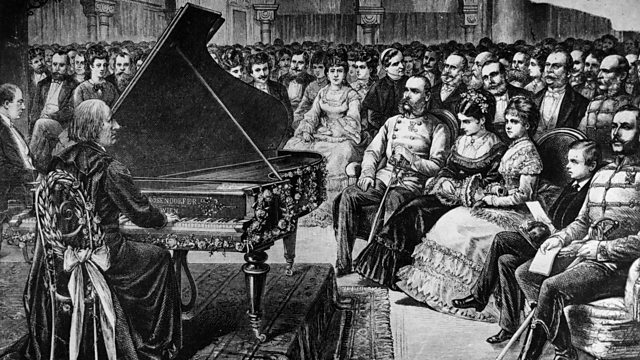
Trailblazer on the Podium
Donald Macleod focuses on how, once established in Weimar, Liszt protected his friend Wagner as he fled arrest and developed a unique style as a conductor.
Donald Macleod explores Liszt's symphonic poems. Now established in Weimar, Liszt protects his friend Wagner as he flees arrest.
In 1848, as revolution raged across Europe, Franz Liszt made the decision to walk away from his life as the most scandalous and brilliant piano virtuoso in the world - and settle down in the provincial German city of Weimar. Over the next twelve years he would forge a reputation as one of the most original composers of the Romantic Era - inventing a genre of composition that became known as the 'symphonic poem'. Liszt's new form of orchestral piece spun poetic or literary fables in music, evoking moods and images in its themes and harmonies, depicting heroes and villains, dramas and triumphs - a radical departure from the symphonic ideal of Beethoven and Brahms. This week, Donald Macleod presents a unique opportunity to hear all twelve of the symphonic poems Liszt created in Weimar - plus his final, valedictory symphonic poem, composed many years later, just before his own death.
As Liszt began to establish a reputation as a composer in Weimar, he also began to cultivate a reputation as an innovative and dynamic conductor. Liszt was diverted from his musical work by the travails of his friend Richard Wagner, who was fleeing arrest after inciting revolution in Dresden. Donald Macleod introduces the symphonic poems Mazeppa and Heroïde Funebre - both rarely played in the concert hall - as well as Liszt's take on the Orpheus myth.
Last on
Music Played
-
![]()
Franz Liszt
6 Grandes etudes de Paganini S.141 for piano
Performer: Lang Lang.- Sony 88697891402.
- Sony Classical.
- 2.
-
![]()
Franz Liszt
Heroide funebre - symphonic poem S.102
Choir: Leipzig Gewandhaus Choir. Conductor: Kurt Masur.- EMI: CZS568595.
- EMI.
- 4.
-
![]()
Franz Liszt
Mazeppa - study S.138 for piano [based on S.137`4]
Conductor: Christoph Eschenbach. Orchestra: Vienna Philharmonic Orchestra.- SONY: 88843070972.
- SONY.
- 2.
-
![]()
Franz Liszt
Orpheus - symphonic poem, arr. Saint-Saens for piano trio
Ensemble: Trio di Parma.- CONCERTO: CD2066.
- CONCERTO.
- 3.
Broadcasts
- Tue 6 Jan 2015 12:00����ý Radio 3
- Tue 6 Jan 2015 18:30����ý Radio 3
- Tue 9 May 2017 12:00����ý Radio 3
- Tue 9 May 2017 18:30����ý Radio 3
Beethoven Unleashed – the box set
What was really wrong with Beethoven?
Composers A to Z
Who knew? Five eye-opening stories from Composer of the Week
Five reasons why we love Parry's Jerusalem
What is the strange power of Jerusalem which makes strong men weep?
A man out of time – why Parry's music and ideas were at odds with his image...
The composer of Jerusalem was very far from the conservative figure his image suggests.
Composer Help Page
Find resources and contacts for composers from within the classical music industry.





